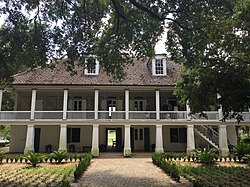Whitney Plantation Historic District
|
Whitney Plantation Historic District
|
|

Front of the Big House
|
|
| Nearest city | Wallace, Louisiana |
|---|---|
| Coordinates | 30°2′21″N 90°39′2″W / 30.03917°N 90.65056°WCoordinates: 30°2′21″N 90°39′2″W / 30.03917°N 90.65056°W |
| Area | 40 acres (16 ha) |
| Built | 1803 |
| Architectural style | Federal, French Creole |
| MPS | Louisiana's French Creole Architecture MPS |
| NRHP Reference # | 92001566 |
| Added to NRHP | November 24, 1992 |
The Whitney Plantation Historic District is a museum devoted to slavery in the U.S. South that is preserved near Wallace, in St. John the Baptist Parish, Louisiana.
The museum opened on the plantation property in December 2014. It was founded by John Cummings, a trial attorney from New Orleans. The grounds contain imaginative exhibits and original art works, such as life-size sculptures of children to symbolize the thousands of children who died while in slavery.
The French Creole raised-style main house built in 1803 is the most important architectural example in the state. In addition, the plantation has numerous extant outbuildings or dependencies: a pigeonnier, a plantation store, the only surviving French Creole barn in Louisiana, and slave quarters. The complex includes three archaeological sites which have had varying degrees of exploration.
The 1884 Mialaret House, with its associated buildings and property, were added by later purchase; they help to reflect the long working history of the plantation. Some of the land is still planted in sugarcane.
Scenes from the 2012 Quentin Tarantino film Django Unchained were filmed on and around the plantation.
The historic district was listed on the U.S. National Register of Historic Places in 1992. Whitney Plantation is also one of 26 sites featured on the Louisiana African American Heritage Trail.
Rear of the Big House
Stairway in the Big House
Reconstruction of Robin's blacksmith shop
...
Wikipedia


